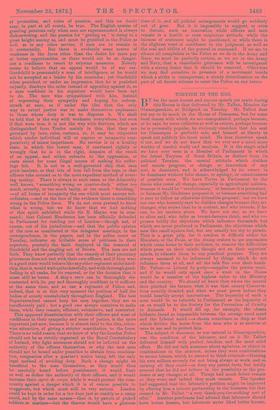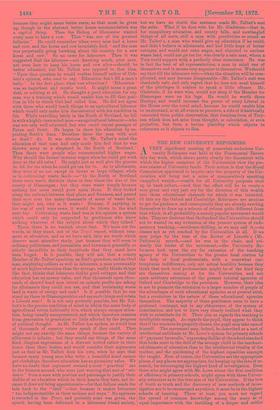TORYISM IN THE EGG.
BY far the most honest and sincere speech yet made during this Recess is that delivered by Mr. Talbot, Member for Glamorganshire, at Bridgend, on Tuesday. Mr. Talbot does not say or do much in the House of Commons, but for some local reason with which we are unacquainted, perhaps because, as he says, he owns collieries as well as estates, perhaps because he is personally popular, he obviously considers that his seat for Glamorgan is perfectly safe, and himself at liberty to speak out publicly his inner mind. He does therefore speak it out, and we do not know that we ever saw a mind more worthy of careful study and analysis. It is the single mind we have ever seen in a Member of Parliament in which the latent Toryism of Great Britain, as distinct from its political Toryism, the mental attitude which dislikes and resists progress, or change, or innovation of any sort, is dominant, and is acknowledged by its owner to be dominant without false shame, or apology, or consciousness of possible error. We have Tories in Parliament by the dozen who resist all change, especially in agricultural matters, because it would be "revolutionary," or because it is premature, or because Mr. Gladstone proposes it, or because something bad is sure to follow an otherwise defensible proposal; but we have not one who honestly says he dislikes changes because they are changes, who avows that he is content, and who intends, if he can, to let matters alone. We have not one, as we have so often said, who talks as tenant-farmers think, and who ex- presses boldly the objections which influence thousands, but which are never produced in Parliament, the objections which men like small squires feel, but are usually too shy to parade. That is a great pity, for it renders it difficult either for Ministers, or the Press, or the stump orators to use arguments which come home to their audience, to remove the difficulties which press on their minds, though not on their superiors' minds, to educate them to any practical purpose. They are always assumed to be influenced by things which do not influence them at all, and all the talk flies over their heads. Mr. Talbot—a Liberal by party—supplies the precise want, and if he would only speak once a week in the House would be a member of the highest value to the Ministry and the country. We should all know then where the mental shoe pinched the farmer, what it was that county Conserva- tives secretly dreaded, and what we must prove before they would heartily accept innovations. The loquacity of such a man would be as valuable to Parliament as the loquacity of an ox would be to the Society for the Prevention of Cruelty to Animals. It would fill up, for example, the chasm hitherto found so impassable between the average rural mind and the Liberal mind,—a chasm sometimes as deep as that which divides the horse from the man who is so anxious at once to use and to protect him. The subject of discourse, as was natural in Glamorganshire, was the condition of the labourer, and on it Mr. Talbot delivered himself with perfect freedom and the most solid effect. He did not talk nonsense about agitators, or object to combinations in the abstract, unless they were combinations to secure leisure, which he seemed to think criminal—blaming his own colliers severely for not being always at work, and so earning all they could—or deny any patent facts, but boldly averred that he did not believe in the possibility or the pru- dence of any changes at all. Things had much better remain as they were, and indeed they must remain. The Speaker had suggested that the labourer's position might be improved by offering him a minute partnership in the business, but that seemed to Mr. Talbot "a very thank-yon-for-nothing sort of offer." Another gentleman had advised that labourers should have better houses, but labourers never liked better houses, because they might mean better rents, so that must be given up, though in the abstract better house accommodation was a capital thing. Then the Bishop of Gloucester wanted every man to have a cow. That "was one of the greatest fallacies." He could remember when every man had a horse and cow, and the horse and cow invariably died, "and the man was perpetually going hawking about the country for a new horse and cow." So no cows for labourers. Then it was suggested that the labourer—not knowing much, poor man, not even how to keep his horse and cow alive—should be better educated, but Mr. Talbot was opposed to that idea. "Upon that question he would confess himself rather of Cob- bett's opinion, who used to say, Education don't fill a man's belly.' In the first place, what was education ? 'Education' was an important and mystic word. It might mean a great deal, or nothing at all. He thought a good education for any man was a training which would enable him to fill that posi- tion in life to which God had called him. He did not agree with those who would teach things to an agricultural labourer which would only make him discontented with his condition in life. While travelling lately in the North of Scotland, he fell in with a highly-instructed man—an agricultural labourer—who was not only well educated, but who could repeat passages of Byron and Scott. He began to show his education by re- peating Scott's lines, Breathes there the man with soul so dead ?' &c. It was obvious to Mr. Talbot's mind the education of that man had only made him feel that he was thrown away as a shepherd in the North of Scotland." Then there were people who recommended higher wages. Why should the farmer increase wages when he could get work done at the old rates ? He might just as well give the grocers 3s. 6d. for tea when he could get tea for 3s. As to allotments, they were of no use except in towns or large villages, while as to cultivating waste lands :—" In the North of Scotland there were waste districts three or four times the size of the county of Glamorgan ; but they were waste simply because nothing but moss would grow upon them. If they looked along the railroad between that place and Swansea, and passed their eyes over the many thousands of acres of waste land, they might ask, why is it waste ? Because, if anything in the way of seed were sown, it would be blown to the wind next day. Cultivating waste land was in his opinion a system which could only be supported by gentlemen who knew nothing whatever of the subject about which they talked." There, there is no varnish about that. We have cut the I words, as they stand, out of the Times' report, without corn- ment or alteration, and as we have said, they are words which ' deserve most attentive study, just because they will seem to• ordinary politicians, and journalists, and townsmen generally, so utterly incredible in their ineptitude that they must have been forged. Is it possible, they will ask, that a county Member of Mr. Talbot's position, an Earl's grandson, and an Oriel man, employing colliers as well as labourers, a man presumably of much higher education than the average, really thinks things like that, thinks that labourers dislike good cottages, and that education has no money value, and that thousands upon thou- sands of shrewd hard men intent on minute profits are asking for allotments they could not use, and that reclaiming waste land is waste of energy and cash? Is it possible that he can stand up there in Glamorganshire and say such things and retain a Liberal seat ? It is not only perfectly possible, but Mr. Tal- bot's is the precise condition of mind in which the main body of agricultural voters habitually live, which always escapes atten- tion, being usually unrepresented, and which therefore remains from generation to generation so little affected by the progress of political thought. As Mr. Talbot has spoken, so would tens of thousands of country voters speak if they could. They might not say exactly the same things, because the variety of sillinesses is infinite ; but they would say things of the same kind, illogical expressions of a distrust rooted rather in their bones than their brains, and would consider their arguments just as final as Mr. Talbot does his own, when he says that because many young men who write a beautiful hand cannot get clerkships, therefore education has no pecuniary value. We have no doubt that argument seemed a most " practical " one to the farmers around, who were just wanting that sort of "evi- dence" from a man with position and patronage to justify their dislike of an education which in their hearts they hate, not be- cause it does not bring appointments—for that failure sends the lads back to the "land "—but because it makes labourers "too independentlike in their notions and ways." No applause is recorded in the Times, and probably none was given, the speech having been delivered to a labourers' friend society, I but we have no doubt the sentence made Mr. Talbot's seat the safer. What if he does vote for Mr. Gladstone—that is, for compulsory education, and county bills, and newfangled things of all sorts, still a man with proclivities so sound as ; Mr. Talbot's, a man who would give up education if he could, and didn't believe in allotments, and had little hope of better , cottages, and would not raise wages, and objected to enclose waste land, could not go too far, was clearly a safe man whom a Tory could support with a perfectly clear conscience. He was in fact the best of all representatives, a man in mind one of themselves and in means very superior to themselves. We should say that till the labourers vote—when the situation will be com- plicated, and may become disagreeable—Mr. Talbot's seat was absolutely safe, and only regret that he does not avail himself of the privileges it confers to speak a little oftener. Mr. Gladstone, if he were wise, would not sleep if the Member for Glamorgan were on his legs. He would be worth three Henleys, and would increase the power of every Liberal in the House over the rural mind, because he would enable him to understand, or at all events to perceive, a side of it habitually concealed from public observation, that formless form of Tory- ism which does not arise from thought, or calculation, or even prejudice, but from a bovine placidity which objects to reformers as it objects to flies.



































 Previous page
Previous page